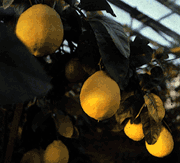
Lemon tree, very pretty...
How to grow a lemon tree indoors
By Marion Owen, Fearless Weeder
for PlanTea, Inc. and
Co-author of Chicken Soup for the Gardener's Soul
FEATURE ARTICLE:

Tom Hanks' "Power of Four" solution
More good stuff:
Who is Marion Owen?
FAQs about PlanTea
Search Marion's articles, tips and recipes
Why grow organic?
News and press releases
Read love letters
How to link to this site
Need a speaker?
How to contact Marion
Visiting Alaska?
Come to Kodiak Island!
Go to home page

Marion's UpBeet Gardener
Newsletter has been
replaced by Marion's blog
which you can find at:
www.marionowen.wordpress.com
My dad makes his Caesar salad dressing from scratch, which
calls for fresh lemon juice. He squeezes the lemons by hand, which yields juice, and sometimes a few seeds...
One time, I noticed a tiny, green shoot emerging from one of the seeds. It had sprouted. Question is, if you plant the seed, will produce fruit someday?

Here's the deal: As long as the seed is not damaged, and it didn't dry out while you were doing the dishes, the odds are good that it will produce a plant. The plant will have oval, shiny green leaves, fragrant winter flowers, and a better chance at usable fruit than sweet citrus like oranges, which need hot summers to develop sugars and seldom bear fruit in confinement (potted, indoors).
 Lemons on the other hand, don't mind life as a houseplant
and will be comfortable in containers as long as the container is large
and the soil in them is well drained. There are a couple downsides, however: For one, seed-grown lemon trees are often a gamble when it comes to height--you
may need a 20-foot ceiling!
Lemons on the other hand, don't mind life as a houseplant
and will be comfortable in containers as long as the container is large
and the soil in them is well drained. There are a couple downsides, however: For one, seed-grown lemon trees are often a gamble when it comes to height--you
may need a 20-foot ceiling!
According to Leslie Land, garden writer for the New York Times, if you're serious about citrus, consider trees that are sold for growing in containers because they are generally dwarf varieties, like the Meyer lemon, or grafted onto dwarfing rootstock.
Meyer lemons are hardier than other lemons and more generous about fruiting. During warm summer periods, you can set them outside for a dose of the real stuff. According to Raintree Nursery, they produce medium size juicy lemons. And here's an added bonus: The waxy white blossoms are lovely and fragrant.
Tips for growing your indoor lemon tree
- WHAT TO LOOK FOR: If you purchase your Meyer lemon from a nursery, look for plants that are at least 2 to 3 years old. Improved Meyer lemons are also suitable as houseplants. They can be maintained at 3 to 5 feet tall and if you have the knack, lemon trees make wonderful Bonsai specimens.
- SOIL: Like most houseplants, citrus prefer a slightly acid, all-purpose
mix, which you can get by using a peat-moss based growing mix. (Remember, you get what you pay for, so don't go for the cheap products.)
- TEMPERATURE: Lemon trees thrive in a normal temperature range of 70 degrees during day
to 55 degrees at night. TIP: Though the plants are evergreen they will go into dormancy and stop growing below 54 degrees F.)
- LIGHT: Set your lemon tree in full sun from a southern exposure.
Trees need lots of light. If that's not possible, supplement the light by installing 40-watt
fluorescent shop lights above the plants -- especially important in the winter, when they need 12 hours of light.
-
 MOISTURE: You'll need to keep the soil evenly
moist and since most interiors are quite dry, mist your plant often
-- daily if you can. Give your lemon tree a shower occasionally.
(They loved to be wiped down gently with a sponge, like the one
at right.)
MOISTURE: You'll need to keep the soil evenly
moist and since most interiors are quite dry, mist your plant often
-- daily if you can. Give your lemon tree a shower occasionally.
(They loved to be wiped down gently with a sponge, like the one
at right.)
-
POLLINATION: When you grow plants indoors, bees and insects can’t pollinate them. So you need to use a paintbrush or cotton swab to rub pollen within the flower. Sometimes they will produce fruit without doing this, but it's a good idea to increase your chances!
- FOR MORE INFORMATION about indoor gardening tips, visit my collection of articles.
 If I've scared you off from growing lemons indoors, my apologies. But don't give up! Consider the alternatives: Kumquats,
for example, will give you the same year-round gifts of shiny leaves,
fragrant flowers and delicious fruit while giving your far less grief.
If I've scared you off from growing lemons indoors, my apologies. But don't give up! Consider the alternatives: Kumquats,
for example, will give you the same year-round gifts of shiny leaves,
fragrant flowers and delicious fruit while giving your far less grief.
Have fun! Cheers to you,
![]()
P.S. What is YOUR favorite recipe for Caeser salad dressing? I'd love to see it. Send me an email to mygarden@alaska.net.
Thanks for visiting and please stop by again. I'll put the coffee on!
Meet Marion Owen /// Learn about PlanTea /// Online Catalog /// Articles, Tips, Recipes /// Get free UpBeet Gardener newsletter /// Read current issue /// Listen to radio show /// Read news and press releases /// More resources and links /// Learn why 'grow organic?' /// View guidelines for retailers /// Read love letters /// Book Marion as a speaker /// Site map /// How to link to us /// Contact us /// Go to home page
PlanTea: The organic plant food in tea bags. http://www.plantea.com
Copyright ©1996 to present: PlanTea, Inc. All Rights Reserved. PO Box 1980, Kodiak, AK 99615-1980 USA
Questions or comments? marion@plantea.com Phone: Toll Free: 1-800-253-6331 (US and Canada); 907-486-2500